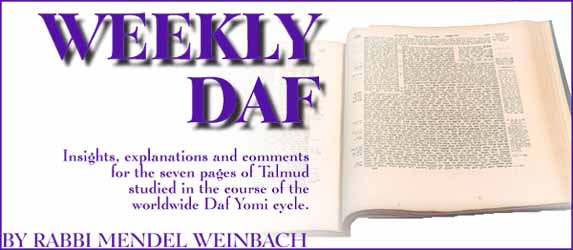Weekly Daf #101
Zevachim 9-15 -- Issue #101
23-29 Teves 5756 / 15-21 January 1996
Mazel Tovs to:Contributing Editor Rabbi Yaakov Asher Sinclair and family on the birth of his son
and
Production Designer Lev Seltzer and his wife Ella on the birth of their "Bachor" (First Born Son)
Rav Weinbach's insights, explanations and comments for the 7 pages of Talmud studied in the course of the worldwide Daf Yomi cycle
A Question of Precedence
The Korban Pesach - the paschal lamb whose blood and fats are sacrificed on the altar and whose flesh is eaten on the night of Pesach - must be slaughtered on the fourteenth day of the Month of Nissan, the day before the Pesach Festival. Whether the time period designated for this slaughtering is limited to the afternoon or extends to the morning as well is a matter of dispute between the Sages.
The Sage Ben Besaira's view is that it may be slaughtered in the morning as well. But if one did not slaughter it until the afternoon and the time already came for the daily afternoon sacrifice - the Korban Tamid - to be offered, then precedence must be given to the Tamid.
How can it be, asks the Talmud, that a sacrifice which could have been offered earlier must now give way to another sacrifice whose time is later?
The precedent for such a ruling, comes the response, is to be found in a law of Tefilah taught by Rabbi Yochanan. The Mussaf Service, which is said on the Sabbath, Festivals and Rosh Chodesh, may be said all day long, from the morning on. But if one did not yet say Mussaf and the time for the Mincha Service arrives in the afternoon he must first say Mincha.
The reason for the precedence both in regard to the korban
and the tefilah is that something which is more regularly
done at a certain time has priority over something of lesser regularity,
in the same manner that a talis, which we wear daily and
even on Shabbos, is donned early morning before tefilin
which are not worn on Shabbos.
Seventy-Two Sages
"I received a tradition from seventy-two elder sage," said the Sage Shimon be Azzai, as he quoted a ruling concerning sacrificial animals slaughtered with improper intention.
Why does he use the singular term sage, asks the Talmud, when he is referring to so large a number of sages? Because, is the explanation, all of the seventy-two sat together in one session and there was such unanimous agreement on this point as if they were all just one person.
This number, seventy-two, appears in one other place in the Talmud (Megilah 9a) in the story of the Greek King Ptolemy who gathered together seventy-two sages of Israel. He locked them in separate rooms and ordered each of them to translate the Torah into Greek. Although there was a need to make some changes from the literal translation in order to avoid misunderstandings a miracle occurred and all the translations were exactly the same.
In both cases we find seventy-two sages in perfect unity. Perhaps
this number represents the totality of the Jewish People with
six sages for each of the twelve tribes. When Moshe was commanded
(Bamidbar 11:16) to gather seventy elders of the people his understanding
was that this number represented six from each tribe. Although
Hashem limited the number to seventy because He wanted the Sanhedrin
to consist of seventy-one members including Moshe the concept
was perhaps established of 72 sages as a unit personifying unity.
General Editor: Rabbi Moshe Newman
Production Design: Lev Seltzer
HTML Design: Michael Treblow
© 1995 Ohr Somayach International - All rights reserved. This publication may be distributed to another person intact without prior permission. We also encourage you to include this material in other publications, such as synagogue newsletters. However, we ask that you contact us beforehand for permission, and then send us a sample issue.
This publication is available via E-Mail
Ohr Somayach Institutions is an international network of Yeshivot and outreach centers, with branches in North America, Europe, South Africa and South America. The Central Campus in Jerusalem provides a full range of educational services for over 685 full-time students. The Jewish Learning Exchange (JLE) of Ohr Somayach offers summer and winter programs in Israel that attract hundreds of university students from around the world for 3 to 8 weeks of study and touring.
 Copyright © 1995 Ohr Somayach International. Send us feedback.
Copyright © 1995 Ohr Somayach International. Send us feedback.Dedication opportunities are available for Weekly Daf. Please contact us for details.







